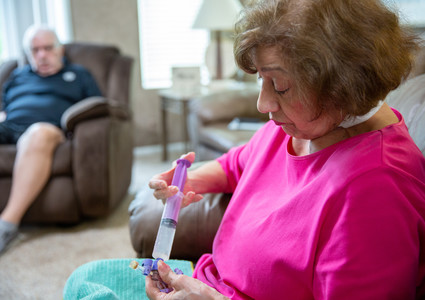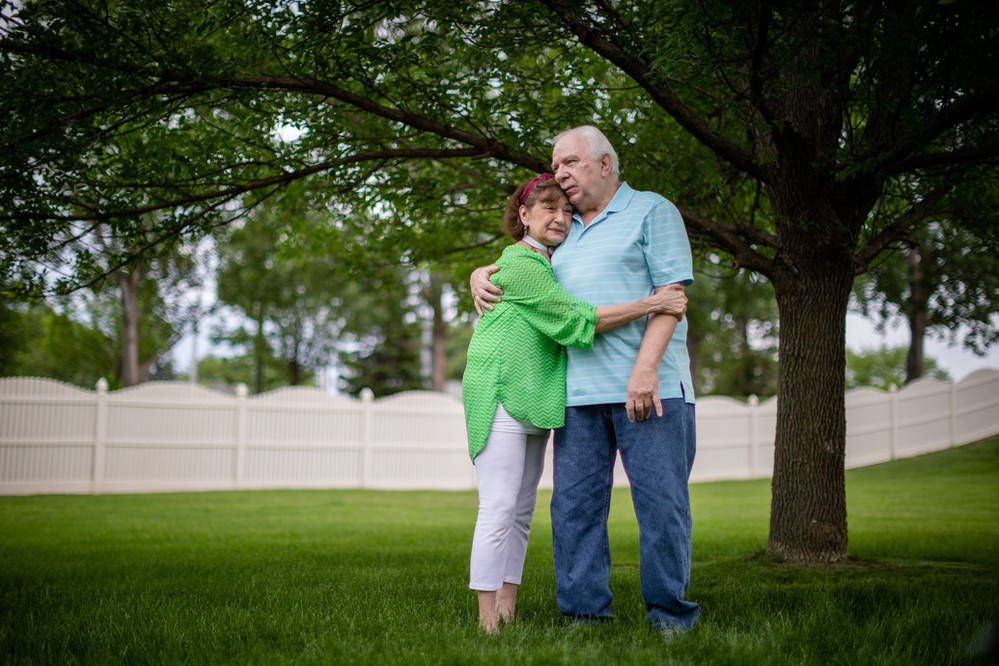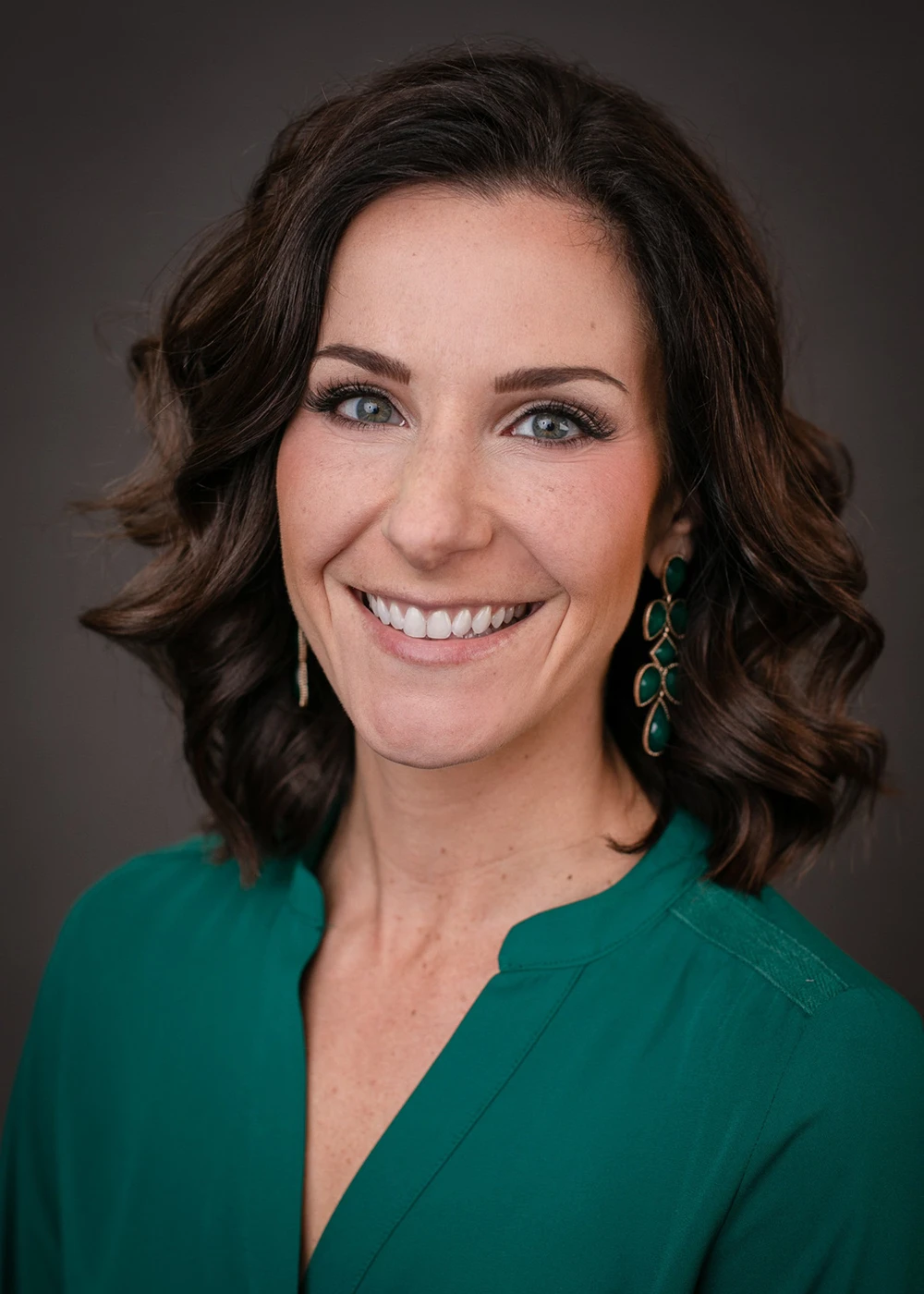
The Meaning of Care Magazine
Making the Most of More Life To Live With the Help of Palliative Care
Published: Aug. 24, 2022A blind date in 1979 sparked a connection between Milo and Shari Mally that family members say exists only in the movies.
“It was like ... soul mates,” Milo said. “We laughed and talked all night. She was beautiful. She’s still beautiful. And she’s a heck of a cook. Clearly – just look at me!”

But after 42 years of marriage, there isn’t much talking between the “soul mates” anymore. And mealtime doesn’t look how it used to.
Shari, 74, still taps into her Mexican heritage to cook Milo some of his favorites, like sopa and tacos. But she, herself, is now tube-fed and largely communicates with a dry erase board after stage 3 laryngeal cancer required the surgical removal of her voice box and multiple throat reconstructions.
Addressing the Misconception
A major bleeding event almost claimed Shari’s life in February during a 71-day Methodist Hospital stay.
“It nearly killed me, too,” Milo said, choking back tears. “Because if she’s done, I’m done. I just knew I couldn’t lose her.”
Another scare came days later when Milo and Shari were approached by Methodist’s palliative care team.
“I thought, ‘Here we go, this is it. They’re here to tell us she’s dying – that this is the end,’” Milo said.
“The biggest hesitation for a lot of families is that misconception that palliative care is end-of-life care,” said Todd Sauer, MD, medical director for Methodist’s palliative care program. “And it’s not just families with that misconception. It’s nurses. It’s physicians. Everybody, it seems, has misconceptions about hospice and palliative care. They kind of lump them together. And, as a result, many patients are started on palliative care too late.”
Living Better and Longer
Hospice care, which is offered at Methodist Fremont Health but accessible to any Methodist patient, focuses largely on comfort care near the end of life. Palliative care, which is offered at all Methodist hospital locations, provides improved quality of life for patients at any point during a complex, life-limiting illness.
“The skill set of palliative care providers is pertinent at the end of life,” Dr. Sauer said. “But not enough people know that it can be done anytime. In fact, research shows that people introduced to palliative care soon after their diagnosis can actually live longer. And it makes sense if you’re in a comfortable place spiritually, socially, mentally and physically. It’s really about looking at the whole person – not just the disease – and trying to give them the best life possible.”
Methodist nurse practitioner Dana Griffin, DNP, APRN-NP, FNP-BC, Shari’s palliative care provider, said her job starts with education – making sure patients and their families are well-informed.
“I often walk into that first consultation, and they don’t have all the information,” Griffin said. “And not because their medical teams don’t inform them. I think any time you have a serious illness, there’s only a portion of what you actually hear sitting face-to-face with the person who’s working hard to cure you. So there’s large value in teaching and reteaching these patients. Because once they understand everything, whatever they decide is absolutely OK. An informed decision is the right decision. And we’re here to help ensure that whatever they decide is carried out.”
Outside of educating Shari and Milo, Griffin made numerous medication adjustments to address Shari’s pain and discomfort. She called a variety of pharmacies to help ensure the lowest cost for those medications. She connected Shari to Methodist’s behavioral health and psycho-oncology team to help ease her anxiety. She set up home health care in those first few weeks following Shari’s hospital stay. She arranged Shari’s appointments with Methodist’s speech and language pathology team to help her learn how to speak and swallow again. Most importantly, she provided a comforting presence.
“She meant so much to me,” Shari inscribed with a dry erase marker.
“Just saying Dana’s name brings tears to my eyes,” Milo added. “I don’t know where Methodist got her. I don’t know where Methodist got any of our doctors or nurses. They’re the greatest. Dana’s the greatest. If we were down, she got us up. We love her.”
“I think that’s the gift of our job,” Griffin said. “To work with a team of like-minded individuals who are up to the challenge of seeing people at their worst and stopping at nothing to make a difference in their lives.”
“Just Getting Started”
Thanks to ongoing outpatient palliative care, Shari continues to recover and grow stronger by the day. Her stamina is steadily increasing, allowing her to do more of the things she loves – like cooking.
As she began preparing dinner for Milo one afternoon in May, he raved about the pork chops she had on the evening’s menu. But he quickly admitted their mediocrity in comparison to her Spanish rice.
As Shari began preparing dinner for Milo one afternoon in May, he raved about the pork chops she had on the evening’s menu. But he quickly admitted their mediocrity in comparison to her Spanish rice.
“Oh, that’s my all-time favorite,” he said. “But I won’t let her make it until she can eat it with me.”
Shari smiled.
And after some practice with her electrolarynx – a small machine that’s held up to the neck to produce sound – Shari successfully spoke the words “I love you,” to Milo – once her most used phrase on her trusty dry erase board.
When asked how he liked the sound of those words, Milo’s eyes welled up with tears as he replied: “Oh, I love her so much. And I’m so lucky we have more time together. The man upstairs took care of that. He gave us Methodist. He gave us palliative care. And just when I thought we were at the end, I learned it was the start of living our life again. We’re not done. We’re just getting started.”

Palliative care can benefit anyone with a serious, life-limiting condition, including but not limited to:
- Cancer
- Chronic obstructive pulmonary disease (COPD)
- Dementia
- Heart disease and heart failure
- Renal failure
Methodist's palliative care team reviews each patient’s situation and medical needs to ensure that services are appropriate for their circumstances. Team members also work closely with the patient’s primary care provider and other specialists to:
- Discuss health care goals and needs
- Give emotional and spiritual support
- Help navigate the health care system
- Offer guidance with various treatment choices
- Provide pain and symptom management
Although palliative care is often started in the hospital at Methodist, patients can transition to outpatient palliative care when they leave the hospital. This provides the reassurance that the same great care they received in the hospital will continue long after discharge.
More Resources
- Read more from the summer 2022 issue of The Meaning of Care Magazine.
- Learn more about palliative care at Methodist.
- Learn more about hospice care at Methodist.
- Learn more about head and neck oncology at Methodist.


